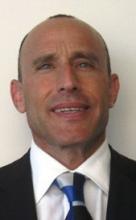MIAMI BEACH – You get along with most of your colleagues in the hospital, but there is that one physician who doesn’t follow the rules, disrupts everyone’s workday, and ramps up the tension when they walk onto the ward.
Advice on which strategies work best to change disruptive and other problematic physician behavior comes from an anesthesiologist who oversees a South Florida health system of more than 1,400 doctors.
Focusing on changing behavior "is primarily what I do now more than anything else. ... It is about getting people to all pull in one direction," said Dr. David Lubarsky, who in September 2011 became CEO of UHealth Physician Practice and associate vice president for UHealth Practice administration at the University of Miami.
Disruptive or above-the-law behavior may garner the most attention, but behaviors related to low productivity, poor resource utilization, or poor patient satisfaction scores also need to change in this era of heightened accountability, Dr. Lubarsky said at a meeting on perioperative medicine sponsored by the University of Miami.
Sometimes there is a significant disconnect between how a disruptive physician perceives their own behavior compared with the impressions of clinicians around them. In such instances, a program such as Physicians Universal Leadership Skills Survey Enhancement (P.U.L.S.E.) 360 can help. "I have referred physicians for this," Dr. Lubarsky said. Essentially, the doctor in question first rates their own workplace behavior, and then the multidisciplinary team around them also completes surveys. Next, the doctor receives very specific feedback on both positive and negative behaviors.
"When they are confronted with this and told specifically what they are doing that isn’t really working, and given alternatives about how to approach a situation – and they see their scores getting better – they get better, they feel better. The whole team operates better. It’s a very positive experience."
Another tip: Don’t expend energy getting physicians to change their behavior when a technologic solution can achieve the same result, said Dr. Lubarsky, who retains his title as Emanuel M. Papper Professor and Chair, Department of Anesthesiology, Perioperative Medicine, and Pain Management, at the University of Miami.
A computerized prompt to administer preoperative antibiotics on time is an example. If this does not happen, other preparations for surgery automatically stop. Another successful intervention addresses incomplete chart documentation. This used to be an issue at the University of Miami when support staff had to "chase down a doctor for a signature," Dr. Lubarsky said. Now, if an attending forgets their documentation, they receive a page. "Incomplete chart documentation is now close to zero."
"You have to make it easy for everyone to do the right thing," he said.
Providing incentives can improve behaviors as well, but some ideas work better than others. Find out what the physicians value to devise meaningful incentives, Dr. Lubarsky said.
Increased commitment and motivation often ensue when physicians and others participate in setting specific, measurable goals. Difficult but achievable goals generate better performance than easy or impossible ones, Dr. Lubarsky noted. "The doctor must believe the goal is within reach."
Keep the plan simple. "Three to five goals are preferable to six or more goals," he said. Avoid complex incentive plans that assign two points for writing a paper, one point for attending a conference, and one point for staying late at work because "nobody understands this."
This era of tracking benchmark data for individual providers raises the question: Why is changing how people deliver care so difficult?
Part of it stems from physician experience and attitude, Dr. Lubarsky said. "After 4 years of college, 4 years of medical school, an average 4 years of training, and an average $150,000 of debt ... you paid for the right to call yourself a physician." Professional autonomy is deeply valued by physicians, he added.
However, "benchmarking, or use of external data, is very common now and it’s very powerful," Dr. Lubarsky said.
Physicians often balk when presented with their numbers, Dr. Lubarsky said. "I have not met a doctor yet who believes they are average or below average. I hear all this time: ‘The numbers are wrong. You have to get the right data.’ " Other reactions include, "So what?" or "My numbers are worse because my patients are sicker." Or there are physicians who dismiss what they perceive as a cookbook approach to medicine: "Are you planning to really make us do all you say and not individualize it for each patient?"
Benchmarking also relates to resource utilization. Physician attitude and behaviors are important because doctors dictate about 85% of the money spent in the hospital, he said.


